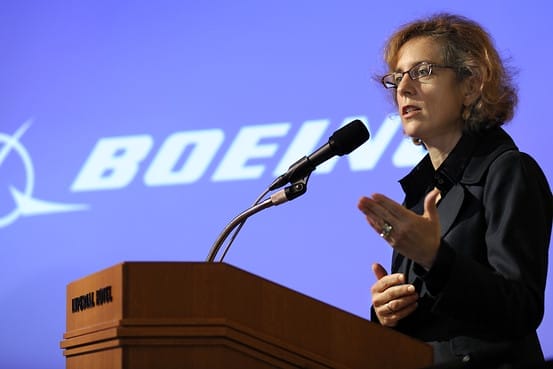At her 8th-birthday party, Nicole Piasecki could not figure out why all the parents were lingering after bringing their kids.
“Since I had grown up with helicopters going in and out of my backyard, I just didn’t know that having one for flights at my birthday party was so unusual,” said Piasecki, whose father, Frank, invented the big twin-rotor helicopter and was an innovator in the helicopter business for a half-century. Nicole Piasecki stayed fascinated with flight and is today the president of Boeing Japan and vice president of Boeing International. Her love for the business came honestly: She spent weekends rummaging around her father’s office.
“I guess you could say I started in the industry at age 3,” she said by phone from Tokyo, where she is based. Ironically, Boeing eventually bought Frank Piasecki’s first company, Piasecki Helicopter, from Vertol Aircraft. After that company’s sale to Vertol, he started Piasecki Aircraft Corp., which is still headquartered in the Philadelphia suburbs, where Nicole Piasecki grew up. “My father worked all the time, so we seven kids had to be taken to the office on Saturdays or he would never see us.”
“I was doing, you might say, engineering on the drafting tables when I was quite young,” said Piasecki. “My dad exposed me to the concept of design and solving engineering problems. The idea of flight was not only fun, but a way to learn how to do practical things.”
Tough Challenges for Aviation
These days, said Piasecki, the problem to be solved in the aviation industry—how to meet the air passengers’ needs—is, to be sure, complicated by high oil prices and concerns for the environment. Despite the current chaos in the commercial airline business, Piasecki said, air travel and transport is simply a fact of modern life and its problems need to be solved.
“Relative to global GDP, air travel is growing at a two percent higher rate,” she said. “As an industry, we have made great progress in environmental concerns, but you would be hard-pressed to find someone who, five years ago, would have predicted oil prices this high.
“That said, aviation will certainly be one of the last businesses using fossil fuel. We have not figured out a way around that,” she said. “But we are doing all sorts of things to develop new technologies to limit emissions and so forth, so I think the air industry has a really robust future, long-term.” But Piasecki sees the industry’s roadblocks as well.
“After 9/11, people just began getting fed up with the air transportation system,” she said. “They got tired of the inefficiencies of the security system, getting manhandled by the airlines, the time it took to clear on every flight. It wasn’t special, and, on the other hand, it wasn’t efficient either.” Piasecki remembers going to the airport in patent leather shoes and a dress as a child. Planes took off when they said they would, meals were free and tasty, and air travel as a whole was an adventure as well as a convenience.
“The problem in our industry is that it takes five years to develop a new aircraft, and it will stay around for the next 60 years,” she said. “So we are an industry that asks, ‘What are the toddlers of today going to be doing? How will they travel and live?’” John Feren, a Boeing vice president and one of Piasecki’s former bosses, cites Piaseki’s combination of drive, competitiveness, and charm as a key to her success. “She has courage and refuses to be intimidated, even in the male-dominated culture that is Boeing and Japan. It is hard not to be a member of her fan club,” he said.
A Standout in Every Crowd
Piasecki studied engineering at Yale, where she was also an all-Ivy lacrosse player, before getting her MBA at Wharton. Despite her aviation roots, Piasecki felt she should know more about both the business and design ends of the industry. At Boeing, she worked in marketing and sales before getting into her current international expertise. Gregory Piasecki, WG’97, who is younger than his sister by nine years, said his immediate family’s epiphany on Nicole’s outside influence came when they attended her Yale graduation.
“They were reading out all these amazing awards — students who had done really significant stuff,” Gregory said. “Then they start talking about this amazing athlete, not only the MVP, but someone who went out of their way to be a leader, and on and on. We’re all rolling our eyes and thinking, ‘Oh, come on.’ “And then they say, ‘Nicole Piasecki,’ and we are all shocked and embarrassed,” he said. “But inside we knew, and we still know, how special Nicole is.”
The Edge of Asia
With a long, strong history of operating in Japan, Piasecki feels confident in Boeing’s global future. It is no secret, she said, that the next huge airline markets will be China and India. Boeing has long had manufacturing operations in Japan as well as the United States, but 35 percent of the new 300-seat Boeing 787 Dreamliner, which will be flying commercially within a year, is being built in Japan, and 100 percent of the composite materials used for the body of the jet—which is making it more fuel efficient—are from Japan.
“We have been in Japan for 30 years, so we have been fortunate to have a long relationship here, which is important for any industry. Ours is truly worldwide, and you need to be in Asia with good relationships to be successful,” she said. “In Japan, the definition of the relationship is more important — it is personal and you have to have that trust. To be a global business, you have to know what is paramount in all parts of the world.”

























